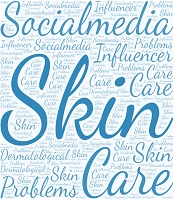Dear Editor,
This article underscores the overarching influence that social media holds over the population and examines the extent to which individuals adhere to skincare advice from "influencers" lacking board-certified dermatologist credentials. Following such guidance renders people more susceptible to skin problems.
Originally designed to facilitate global connections and the exchange of ideas, social media networks, including Facebook, Instagram, Twitter, YouTube, TikTok, and Snapchat, have become the most widely used networking platforms. However, social media has recently evolved into a hub for immediate information access. Beyond serving as a tool for consumers to make purchases, it is now utilized as a platform by dermatologists, other medical professionals, and influencers in the beauty and skincare industries to offer guidance to the public on selecting the best products for their needs and educating them on proper aesthetic procedures (1, 2). While social media furnishes extensive knowledge, it also harbors drawbacks.
The research employed the following search engines: Google Scholar, ScienceDirect, PubMed, and Scopus. A comprehensive literature review on the influence of social media on other social media platforms was conducted using content analysis and comparative analytic techniques. A total of 50 English-language publications were selected, each meticulously examined for relevance to the topic.
While many certified dermatologists use their social media platforms to raise awareness about various dermatological disorders and provide recommendations on different products, there is a specific segment of the population self-identifying as 'skin-care influencers,' 'cosmetologists,' 'acne-warriors,' and 'aestheticians.' These individuals are typically non-medically certified and lack the credentials to offer recommendations about skin disorders. Despite their lack of medical expertise, these influencers amass thousands to millions of followers on social media, generating content on skincare problems and sharing personal experiences. Additionally, they often endorse skincare brands for financial gain. This phenomenon has had a detrimental impact on the adolescent population, who blindly adopt skincare trends promoted by these influencers. Some of the most widely followed skincare trends include the consumption of skincare supplements and engaging in do-it-yourself (DIY) skincare treatments, such as applying lemon to the face and making unhealthy dietary changes (3).
While social media misinformation can impact various healthcare specialties, it is particularly prominent in dermatology. According to a recent poll conducted by the American Society for Dermatologic Surgery, social media ranked sixth in influencing decisions regarding cosmetic surgery and was among the top three considerations for purchasing skincare products. Moreover, 41.0% of patients utilize Instagram to follow their current or potential healthcare providers, with 43.0% of consumers citing the provider's social media presence as a factor when scheduling appointments (1). This trend has resulted in discrepancies, as a significant number of individuals have embraced a healthy skincare routine comprising a cleanser, moisturizer, and sunscreen. However, a considerable percentage of people also face challenges due to the limited information provided through advertisements. They often use products unsuitable for their specific skin type, resulting in issues such as acne vulgaris, contact dermatitis, retinoid dermatitis, and topical steroid-damaged face, among others.
A recent examination of popular social media platforms in dermatology was conducted by Szeto et al. (4). They highlighted various issues, such as the prevalent use of user-directed ads on Facebook. For instance, among the most popular sites promoting hair loss on Facebook, only 3% - 13% of recent posts contained health information endorsed by a medical or scientific professional or referenced published research. In contrast, the majority, ranging from 56% - 95%, focused on the promotion of hair loss products and hair restoration clinics (5). Similarly, a substantial number of Instagram posts were identified as either promotional or advertising in nature.
According to a recent study focusing on Instagram hashtags related to skin color, dermatologists represented only 12% of the top contributors, with non-dermatologists generating the majority of posts (6). Conflicts of interest may arise as the majority of non-dermatologist influencers, along with some dermatologists, actively promote goods and services on Instagram (7).
As the social media culture continues to grow, a significant portion of the population gains easy access to health and skincare information, primarily disseminated by non-licensed social media personalities. Consequently, social media has begun to impact the skincare decisions of its users, particularly among women and teenagers. Recognizing the uniqueness of every skin type and the diverse skincare needs each individual possesses is crucial. Adopting a generic viewpoint and following the skincare regimens and cosmetic procedures of others may not yield the desired outcomes.
Furthermore, dermatologists who actively engage on social media platforms should make a concerted effort to counteract false information and share reliable, fact-based insights.
In conclusion, practical day-to-day skincare advice from a dermatologist would include using a good face wash or cleanser to clean the face, followed by the application of a moisturizer, and then using a sunscreen with SPF 30 or above to address various skin concerns.
